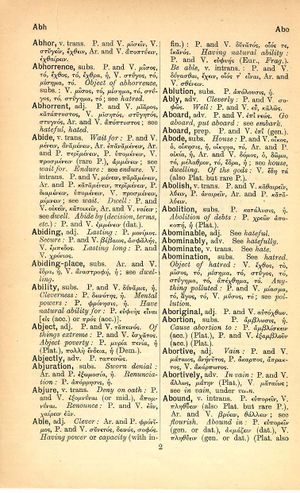abound: Difference between revisions
From LSJ
Ἔνιοι δὲ καὶ μισοῦσι τοὺς εὐεργέτας → Nonnulli oderunt adeo beneficos sibi → Es hassen manche sogar ihre Wohltäter
(Woodhouse 2) |
(CSV2) |
||
| Line 1: | Line 1: | ||
{{ | {{Woodhouse1 | ||
| | |Text=[[File:woodhouse_2.jpg|thumb|link={{filepath:woodhouse_2.jpg}}]]'''v. intrans.''' | ||
P. εὐπορεῖν, V. πληθύειν (also Plat. but rare P.). Ar. and V. βρύειν, θάλλειν; see [[flourish]]. | |||
<b class="b2">Abound in</b>: P. εὐπορεῖν (gen. or dat.), ἀκμάζειν (dat.), V. πληθύειν (gen. or dat.) (Plat. also but rare P.), πλήθειν (gen.), Ar. and V. βρύειν (gen. or dat.). | |||
<b class="b2">Flow with</b>: P. and V. ῥεῖν (dat.). | |||
<b class="b2">Let the means of life abound</b>: V. περιρρείτω [[βίος]] (Soph., El. 362). | |||
<b class="b2">Abounding in</b>: V. φλέων (dat.); see [[rich in]]. | |||
}} | }} | ||
Revision as of 09:03, 21 July 2017
English > Greek (Woodhouse)
v. intrans.
P. εὐπορεῖν, V. πληθύειν (also Plat. but rare P.). Ar. and V. βρύειν, θάλλειν; see flourish.
Abound in: P. εὐπορεῖν (gen. or dat.), ἀκμάζειν (dat.), V. πληθύειν (gen. or dat.) (Plat. also but rare P.), πλήθειν (gen.), Ar. and V. βρύειν (gen. or dat.).
Flow with: P. and V. ῥεῖν (dat.).
Let the means of life abound: V. περιρρείτω βίος (Soph., El. 362).
Abounding in: V. φλέων (dat.); see rich in.

